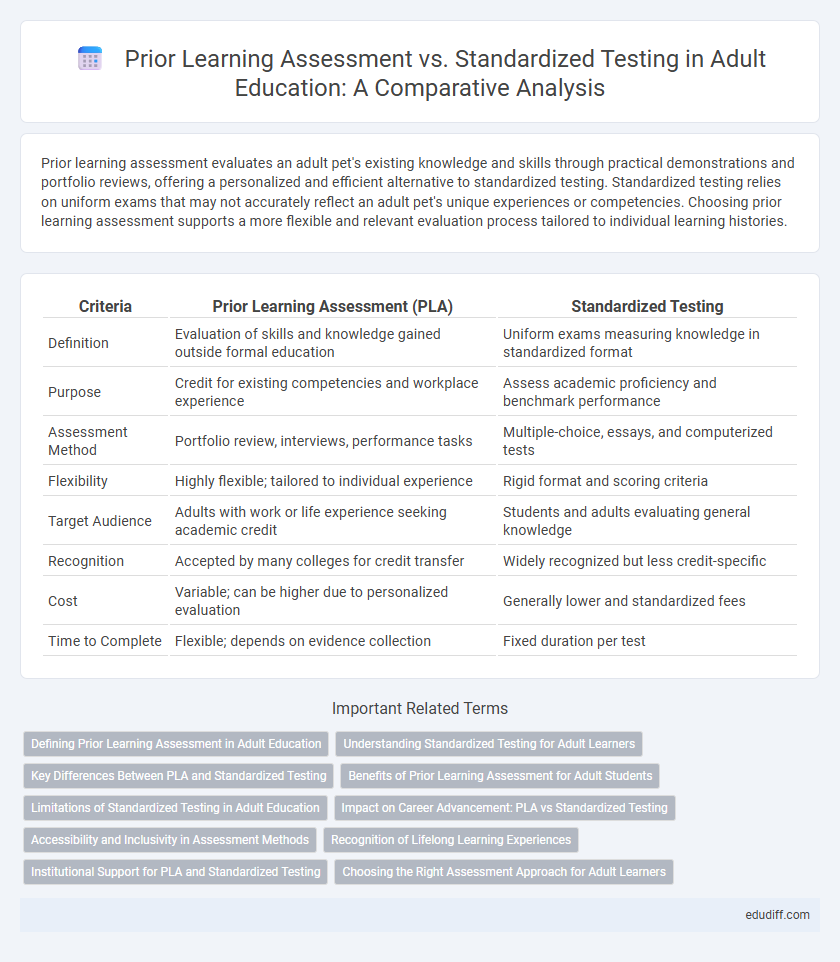Prior learning assessment evaluates an adult pet's existing knowledge and skills through practical demonstrations and portfolio reviews, offering a personalized and efficient alternative to standardized testing. Standardized testing relies on uniform exams that may not accurately reflect an adult pet's unique experiences or competencies. Choosing prior learning assessment supports a more flexible and relevant evaluation process tailored to individual learning histories.
Table of Comparison
| Criteria | Prior Learning Assessment (PLA) | Standardized Testing |
|---|---|---|
| Definition | Evaluation of skills and knowledge gained outside formal education | Uniform exams measuring knowledge in standardized format |
| Purpose | Credit for existing competencies and workplace experience | Assess academic proficiency and benchmark performance |
| Assessment Method | Portfolio review, interviews, performance tasks | Multiple-choice, essays, and computerized tests |
| Flexibility | Highly flexible; tailored to individual experience | Rigid format and scoring criteria |
| Target Audience | Adults with work or life experience seeking academic credit | Students and adults evaluating general knowledge |
| Recognition | Accepted by many colleges for credit transfer | Widely recognized but less credit-specific |
| Cost | Variable; can be higher due to personalized evaluation | Generally lower and standardized fees |
| Time to Complete | Flexible; depends on evidence collection | Fixed duration per test |
Defining Prior Learning Assessment in Adult Education
Prior Learning Assessment (PLA) in adult education evaluates and awards academic credit for skills and knowledge acquired outside traditional classrooms through work experience, military service, or independent study. Unlike standardized testing, PLA offers personalized assessments such as portfolio reviews, interviews, or competency exams tailored to individual learning achievements. PLA enhances educational accessibility and accelerates degree completion by recognizing diverse adult learner experiences.
Understanding Standardized Testing for Adult Learners
Standardized testing for adult learners offers a consistent measure of academic skills and knowledge, often required for college admissions or credentialing. These tests, such as the GED or CLEP, assess competencies in core subjects like math, reading, and writing, providing a benchmark for educational attainment. Understanding test formats, time constraints, and scoring criteria is essential for adult learners to effectively prepare and succeed in these assessments.
Key Differences Between PLA and Standardized Testing
Prior Learning Assessment (PLA) evaluates an adult learner's existing knowledge and skills gained through work, training, or life experiences to award academic credit, emphasizing personalized portfolio reviews or interviews. Standardized testing measures knowledge through uniform exams designed to assess specific subject proficiency under timed conditions, focusing on quantifiable scores. PLA offers flexible, experience-based credit recognition, while standardized testing relies on formal, objective evaluation methods.
Benefits of Prior Learning Assessment for Adult Students
Prior Learning Assessment (PLA) offers adult students the advantage of earning academic credits for knowledge and skills acquired through work experience, military service, or independent study, accelerating degree completion and reducing education costs. Unlike standardized testing, PLA provides a personalized evaluation that recognizes diverse learning paths, increasing motivation and engagement among non-traditional learners. This method supports adult learners by validating practical expertise, enhancing career advancement opportunities and improving retention rates in higher education programs.
Limitations of Standardized Testing in Adult Education
Standardized testing in adult education often fails to accurately reflect the diverse skills and real-world experiences that adult learners bring, leading to limited recognition of practical knowledge. These tests typically emphasize rote memorization and fixed curricula, which may disadvantage adults with varied educational backgrounds or non-traditional learning paths. Consequently, reliance on standardized assessments can hinder personalized learning strategies and underestimate the competence of mature students.
Impact on Career Advancement: PLA vs Standardized Testing
Prior Learning Assessment (PLA) significantly accelerates career advancement by formally recognizing existing skills and knowledge, enabling professionals to bypass redundant training and obtain credentials faster. Standardized testing often requires extensive preparation and may not fully reflect practical experience, potentially delaying certification and job promotions. Employers increasingly value PLA for its alignment with real-world competencies, making it a more effective pathway for adult learners to progress in competitive job markets.
Accessibility and Inclusivity in Assessment Methods
Prior learning assessment (PLA) offers greater accessibility by recognizing diverse educational backgrounds and life experiences, accommodating adult learners with non-traditional credentials. Standardized testing often imposes rigid time constraints and cultural biases that can hinder inclusivity for individuals with disabilities or limited formal education. Emphasizing PLA supports equitable assessment by validating practical knowledge and skills beyond academic test performance.
Recognition of Lifelong Learning Experiences
Prior learning assessment (PLA) evaluates an individual's existing knowledge and skills acquired through work, volunteering, or informal education, offering a personalized recognition of lifelong learning experiences. Standardized testing measures knowledge against uniform benchmarks, often failing to capture the depth and diversity of experiential learning. PLA provides a flexible and holistic approach that acknowledges real-world competencies beyond traditional academic metrics.
Institutional Support for PLA and Standardized Testing
Institutional support for Prior Learning Assessment (PLA) often includes dedicated advisors, flexible credit recommendations, and integration with degree pathways to recognize informal and experiential learning. Standardized testing support typically involves preparation workshops, testing centers, and clear policies for credit equivalency aligned with national or regional standards. Effective institutions balance resources to help adult learners navigate both PLA and standardized test options for accelerated credential completion.
Choosing the Right Assessment Approach for Adult Learners
Prior learning assessment (PLA) offers adult learners the advantage of recognizing experiential knowledge, providing flexible and personalized evaluation compared to standardized testing, which often relies on uniform metrics and timed conditions. PLA methodologies align well with career-focused adults seeking credentialing through professional experience, while standardized tests may suit learners needing benchmark comparisons across academic competencies. Selecting the right assessment approach depends on the learner's goals, existing knowledge, and the intended use of the credential, ensuring both validity and relevance in adult education pathways.
Prior learning assessment vs Standardized testing Infographic

 edudiff.com
edudiff.com